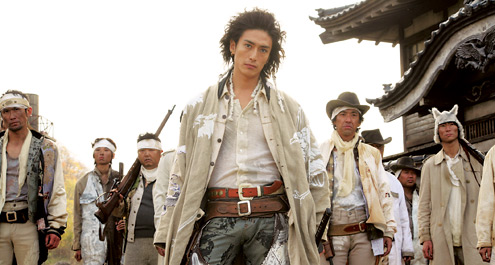Title: Yatterman
Director: Takashi Miike
Released: 2009
Starring: Sho Sakurai, Saki
Fukuda, Chiaki Takahasi, Kyoko Fukada, Kendo Kobayashi, Katsuhisa Namase,
Junpei Takiguchi, Anri Okamoto, Sadao Abe, Koichi Yamadera
Plot: Gan Takada (Sakurai) and his
girlfriend Ai (Fukuda) live a double life as the crime fighting heroes
Yatterman protecting the city of Tokyoko from the schemes of the Doronbo gang
who have been despatched by their boss Skullobey (Takiguchi) to find all four
pieces of the legendry Skull Stone.
Review: The career path of director Takashi Miike continues
to be a fascinating one to chart, especially since he seemingly made the choice
to branch out from his roots established with the gore soaked shock and awe of the films which made up his
outlaw years and which equally helped him found a strong fanbase amongst
Western audiences. While it’s also true that this change of direction which has
certainly seen his output get lighter with these later films might have polarised his fanbase he has
equally at the same time produced some of the most interesting films of his
career of which this is certainly another great example.
Based on the popular anime series of the same name which
despite having 108 episodes never seemingly made it over to the rain soaked
shores of the UK, so its safe to say I went into this one completely blind with
not even the knowledge of Miike being in the director’s chair being any kind of
guide after all here we have a director who gave the world both “Ichi The
Killer” and “For Love’s Sake”.
Forgoing the traditional superhero movie plotting, Miike
clearly believes his audience would be up to speed on the show before they
watched the movie as he throws us straight into a big mecha battle between
Yatterman (yes they are both called Yatterman) and the Doronbo Gang who have
wheeled out their latest mecha invention in the form of a robot chef. It’s a
fun opening which essentially sets the tone for what’s to follow as here Miike
is clearly in one of his lighter and certainly more playful moods. That’s not
of course to say that he still doesn’t manage to sneak in a few screwed up
moments, I mean just wait to see what he does with the mecha Bride that the
Doronbo gang build in the second half of the film.
The character designs are kept the same as the original
show, which is honestly kind of refreshing in these times were since
Christopher Nolan’s Batman trilogy directors constantly seem to be aiming for
an element of realism when it comes to directing comic book movies rather than
embracing the fantastical elements the genre allows, which is certainly
something that Miike has no issues doing as clearly seen with the character
design for the members of the Doronbo gang as we have the PVC clad boss Doronjo
(Fukada) the rat faced mecha genius and generally lecherous pervert Boyacky
(Namase) and rounding out the team we have the pig snout wearing strongman
Tonzra (Kobayashi). Despite being so outlandish in their appearance here they
strangely work as Miike once again crafts a world for his film to exists within,
while at the same time shooting it with such a sense of quirky fun so that like
so many aspects of the film you don’t really question it.
One of the moments which truly highlights this is the
various get rich schemes that the Doronbo launch to fund their the construction
of their latest mecha, which usually share a theme, hence they open a wedding
store called “Doro Merry” to fund the construction of the mecha bride “The
Bridesmaidiot” or their Yo-Sushi style restaurant they create to fund their
giant meca-squid. Interestingly this trio of bumbling crooks we get to know
more about than either of our main heroes, in particular their aspirations they
hope to gain from their criminal enterprises which you probably won’t be
surprised to know are as random as they are, in particular Boyacky’s dream of
having every schoolgirl in the world as the film cuts to him buried up to his
neck in a mountain of Japanese schoolgirls. Again like so many of the more
random aspects of the film it is hard to tell what is taken from the source
material and what’s the result of Miike’s warped imagination.
The action scenes throughout are exciting and fast paced,
while containing numerous amounts of slapstick and surreal moments, especially
when they wheel out the giant mecha with Yatterman’s own mecha coming in the
form of a giant robo dog called Yatterwoof which they also use to get around as
seen in one of the numerous musical numbers. Aswell as all the giant robot fun
we also get some more traditional fight scenes, which usually descend into Boyacky
and Tonzra being on the wrong end of the gadgets used by Yatterman. Still these
could hardly be considered brutal beatdowns especially when the cartoony vibe
is maintained throughout.
While the film is for the most part a lot of fun, it does
have a rather generous runtime which certainly could have benefited from being trimmed
down to a more lean runtime, especially when there are so many scenes which
felt overplayed or unneeded, while at the same time perhaps stopping the plot
from becoming as confused as it does in places and while some Miike fans might feel that Miike has lost his
edge with these kinds of films which he has been keener to make as of late
rather than his earlier and certainly more warped and arguably interesting
films, but here he once again proves that even without the lashing of gore and
controversial imagery he is still a director capable of producing attention grabbing
and most importantly entertaining films, while at the same providing an fun
alternative to the overly serious tone that Hollywood would prefer to take for
its comic book movies.



























